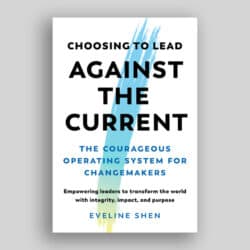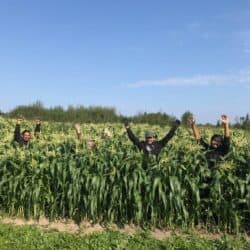With a global retreat on DEI measures underway, Mothers Matter Canada’s Yusra Qadir examines the effect on organizations serving marginalized communities and issues a call to action to government and funders.
A powerful retreat is underway globally – one that threatens to undo decades of hard-won progress on racial and gender equity. Canada is not immune to the rollbacks or their impact. As governments at various levels, the private sector, and funders roll back “gender-based analysis plus” (GBA+) and diversity, equity, and inclusion (DEI) measures, Canadian organizations, especially those serving and led by Indigenous and racialized communities and women, are being forced to navigate an uncertain and hostile landscape. The rollbacks are not just bureaucratic reversals of commitments and funding; they are ideological rejections of equality and social justice work.
While the reinstatement of the minister of women and gender equality is a welcome measure, Canada’s new government has scrapped the Ministry of Diversity, Inclusion and Persons with Disabilities, leaving diverse communities and people with disabilities without a voice at the policy table. In the private sector, companies such as Shopify and Molson Coors (a Canadian/US company) have rolled back their DEI commitments; an open letter in February 2025 from tech leaders condemned the cutbacks. Rollbacks in the United States affect Canadian non-profits directly as many corporate funders operate in Canada and fund community initiatives – initiatives that may now not prioritize or fund DEI work.
“It is not that there is an attack on DEI that is worrisome; it is the success of that attack that is worrisome,” says Sudip Minhas, executive director of Settlement Assistance and Family Support Services, an organization in Scarborough, Ontario, that serves refugee and immigrant communities and women and children affected by violence. “The reason more people have bought into the idea that DEI somehow encourages incompetence and punishes those that are deserving is because this false premise justifies their sense of privilege.”
It is not that there is an attack on DEI that is worrisome; it is the success of that attack that is worrisome.
Sudip Minhas, Settlement Assistance and Family Support Services
For front-line organizations, especially those led by women and gender-diverse people, the question is not only how to survive this moment, but how to do so without losing the heart of their work and their core values: equity, dignity, and community.
This article explores how these rollbacks are affecting organizations serving women and Indigenous and racialized communities, and women and Indigenous and racialized leaders, and delves into how organizations are preparing to weather the storm.
Challenges for organizations serving racialized and Indigenous communities
Loss of funding and existential crisis: One of the most immediate consequences of the rollback is the reduction or removal of targeted funding streams that supported DEI-aligned programming. These funds are sparse to begin with and are critical to addressing long-standing disparities in health, education, employment, safety, and well-being for racialized and marginalized communities. With their sudden disappearance, organizations face significant financial uncertainty, leading to project cancellations, layoffs, and reduced capacity to serve those most in need. For smaller, grassroots organizations – often led by women and equity-deserving groups – this loss of funding is existential.
Burnout and emotional fatigue: Non-profit staff, especially those from racialized and Indigenous communities, are experiencing unprecedented levels of burnout. They have been on a not-fun roller coaster ride navigating service delivery during COVID, adjusting services to the new normal, and now bracing for the adversity the GBA+ and DEI rollbacks will bring. Women, especially mothers who are leaders, are disproportionately affected, often balancing care responsibilities at home with emotionally and mentally taxing roles at work. Already stretched thin by pandemic-related pressures, these workers are now forced to justify the legitimacy of their work in a shifting political climate. Many face the double burden of advocating for their communities while contending with institutional racism and workplace precarity.
Broken community trust: Programs that offer lifelines for underserved communities vanish alongside the funding, including those that address issues like preventing gender-based violence, culturally safe interventions supporting maternal care, and economic empowerment initiatives for racialized women. The disruption erodes trust between organizations and the communities they serve – trust that takes years to build; trust that all funders (including the government) require organizations to maintain and strengthen for all program delivery. When services vanish without warning, community members feel abandoned, which leaves women and Indigenous and racialized leaders and their organizations alone to be accountable to the community. Many leaders and staff volunteer time and resources at a personal cost to sustain community connection and trust, embodying their values to support a system that has essentially abandoned them and their communities.
Should the political climate change and funding become available again, regaining community trust, rebuilding staff capacity, and restarting programs requires much more time, effort, and money than sustaining programs would. Creating an impact takes even more time, effort, and resources as the sudden halts reverse hard-earned gains, and put organizations and communities in a “one step forward, three behind” situation.
Reputational and political risk: DEI language and anti-racist advocacy are often fodder for political point-scoring – used to both show how they contribute significantly to or hinder economic growth. Organizations have no choice but to be increasingly cautious about the language they use to survive any political climate for the sake of the communities they serve, bolstering or watering down mission statements and public communications to avoid being seen as too “right” or too “left.” This puts the burden of “reframing narratives” on organizations, and this self-censorship undermines organizations’ core values and stifles their role as catalysts for justice and enablers for systemic change. Women and racialized and Indigenous leaders, in particular, face disproportionate backlash, systemic racism, and online harassment when they disseminate their narratives.
Increased demand and decreased capacity: On one hand, dwindling government services make inequities grow, which increases the demand and urgency of services needed from the non-profit sector. On the other hand, non-profits struggle to navigate uncertainty and increased demand for services with decreased staff and resources.
[The resulting] fragmentation disproportionately affects women’s organizations that rely on intersectional analysis to serve diverse and complex community needs.
Amy Robichaud, Mothers Matter Canada
Amy Robichaud, the CEO of Mothers Matter Canada, an organization dedicated to uplifting vulnerable mothers and their families to reach their full potential in Canada, is worried about weakening coalitions and unhealthy competition for resources. “These rollbacks also leave non-profits, especially those led by Indigenous and racialized people, strategically adrift. Without shared frameworks like GBA+ to guide collaboration and funding, the non-profit sector is fragmented. Service and community needs further pit organizations against each other to compete for funding, weakening or breaking coalitions. This fragmentation disproportionately affects women’s organizations that rely on intersectional analysis to serve diverse and complex community needs.”
How are non-profits bracing for the storm?
Despite these challenges, organizations serving Indigenous and racialized communities – many led by women and racialized and Indigenous people – are not retreating. They are adapting with resilience, drawing on deep community-rooted wisdom, innovating, and advancing.
Exploring community-driven funding models: In the face of unreliable government support, many organizations are diversifying their revenue streams and turning to their communities to enhance communal reliance and resilience. Grassroots fundraising, social enterprises, and partnerships with values-aligned philanthropists are becoming more central. These models empower organizations to deepen community investment in their work, enhance community ownership, and stay true to their core values.
Building collective power: Organizations, especially those led by women, are increasingly forming alliances and networks to share resources, amplify advocacy, sustain programming, and hold each other up in turbulent and uncertain times. These relationships help them weather the storm, and redefine what resilience looks like in this moment, through a feminist and intersectional lens.
These rollbacks try to send a message that our voices and experiences don’t matter. We respond to this by leaning into what keeps us grounded: our purpose, our values, and each other.
Tina Strehlke, Minerva BC
“Prioritizing economic progress without investing in the success of women and gender-diverse people is like trying to build a house with half the foundation missing,” says Tina Strehlke, the CEO of Minerva BC, an organization that is changing the face of leadership by elevating the visibility, influence, and contribution of women. “While DEI initiatives and practices may have fallen short, the outcomes of having a diverse, equitable, and inclusive society benefits us all.”
“These rollbacks try to send a message that our voices and experiences don’t matter,” Strehlke says. “We respond to this by leaning into what keeps us grounded: our purpose, our values, and each other. It’s about building strong networks, protecting our energy, and remembering that pushback is part of the work.”
“We can lift each other up by showing up for one another in real, everyday ways – sharing opportunities, listening, making space, and celebrating each other’s wins,” she adds. “It’s about being intentional with our support.”
Reframing systems, advocacy, and evidence-packaging: The culture around what evidence needs to look like keeps changing. GBA+ and DEI allowed authentic storytelling and deep cultural work as qualitative data alongside numbers, but many organizations anticipate that the rollbacks will mean collection and provision of more quantitative data to legitimize funding and programs – so, more of how much and how many and less of how well. Organizations are reviewing their public messaging and advocacy materials and tools to adapt. And they’re sharing learning and data to support each other’s work. “The attack on, and dismantling of, DEI research and programs in the USA is a major setback not only for marginalized people and their families, but the country as a whole,” says Margo Hilbrecht, executive director of The Vanier Institute of the Family, an independent Canadian think tank committed to enhancing family well-being by making information about families accessible and actionable. “It hampers our understanding of diversity and inequality and evidence-based efforts to create a level playing field for all families to thrive and fully participate in society. Canada is not immune to the political forces driving this rollback, and it is essential for organizations serving marginalized families to continue to share evidence recognizing the contributions of DEI policies and initiatives to the well-being of families.”
Canada is not immune to the political forces driving this rollback.
Margo Hilbrecht, Vanier Institute of the Family
Strategic recruitment: Recognizing the long road ahead, many organizations are recruiting strategically, hiring staff with multiple skills so they can potentially handle multiple roles at times when all positions cannot be supported. For smaller organizations, often run by equity-deserving groups, wearing multiple hats is a survival strategy. Various organizations are also holding off recruitment and adding to the workload of existing staff. While this keeps non-profit workers (mostly racialized women) in jobs, it means they have to work harder alongside fulfilling care-work responsibilities in their domestic and communal spheres. Many organizations reach out to their communities to show up as volunteers or donate time to keep the program running with low or no staff costs.
Holding the line on core values: In the face of immense pressure to dilute their missions, many organizations are holding firm to their values and pushing back on the rollbacks through campaigns and targeted advocacy. They are saying no to compromising on social justice and to depoliticizing their identities. They are standing up to continue centring clients and communities.
“Rollbacks on DEI create real risks for organizations like us working with [Black, Indigenous, and people of colour] communities,” says Sahra Hashi, executive director of the Alberta Immigrant Women and Children Centre (AIWCC). “They shift us away from hard-earned progress and exclude marginalized communities. At AIWCC, the impact is immediate: communities feel shifts, whether reduced funding or decreased opportunities. This means navigating increased barriers to access, diminished trust, and the need to advocate even more fiercely for equity, diversity, and inclusion. We are reinforcing ourselves by strengthening our mission, enhancing our network of solidarity, and investing in the leadership of the most impacted communities. AIWCC will continue addressing unconscious bias by providing training and creating a culture where communities feel comfortable discussing their biases. Surely, our mission remains unchanged and our commitment is stronger.”
We are reinforcing ourselves by strengthening our mission, enhancing our network of solidarity, and investing in the leadership of the most impacted communities.
Sahra Hashi, Alberta Immigrant Women and Children Centre
In a nutshell, these rollbacks are deepening inequities, reducing access to services, and destabilizing organizations. Non-profit staff (mostly women and racialized and Indigenous people) are facing precarious employment and emotional burnout. Communities are at risk of losing services. These are not theoretical outcomes; they are already happening – like a chain reaction stemming from the policy in the United States, the tariff wars, what we are seeing in Canada in terms of shifting priorities as well as the reaction to the tariffs, and the changed positioning of large corporate organizations.
Such rollbacks will reverse hard-won progress on equity, reconciliation, and inclusive governance. Civil society will become less diverse, less representative, and less responsive to the needs of marginalized communities. Women who lead or work in community organizations may be forced to step away from paid roles or leadership opportunities because of exhaustion and burnout from work stress as well as intensified unpaid care work. Their voices and their leadership, already underrepresented, risk being further sidelined. The exit of women leaders from the non-profit sector as a result of burnout and instability would mean a loss of gendered perspectives and advocacy.
And ultimately, without intentional reinvestment in equity and social justice, Canadian society will continue to fail those it has historically excluded, and more families will be marginalized.
The call to action
This is a pivotal moment. The rollbacks of GBA+ and DEI policies signal more than a shift in funding and priorities. They represent a crossroads for Canada’s social and political identity. Will we continue to advance equity and justice, or will we regress into systems that exclude, marginalize, and divide?
Anuradha Dugal, executive director of Women’s Shelters Canada, expresses concern about the deep impact of the reversals of GBA+ and DEI: “In Canada, the root causes of racism, inequity, and discrimination continue to play out in our systems. I name those root causes as patriarchy, colonialism, and white supremacy. Their inevitable conclusion is violence, most often on Indigenous women in Canada, because of the way colonization established itself here, and then on Black and Brown bodies. So at a time when DEI and GBA+ measures are ignored, pushed away, denied, or utterly demonized, this violence will go unchecked. This is more than worrying; it is potentially fatal.”
“As leaders at this time, from these communities, there is – we have! – a strong imperative to crack this wall of denial and demonstrate that DEI/GBA+ efforts are essential, evidence-based, and lifesaving,” Dugal adds. “Yet our evidence and our very selves are undermined and dismissed.”
As leaders at this time . . . there is – we have! – a strong imperative to crack this wall of denial and demonstrate that DEI/GBA+ efforts are essential, evidence-based, and lifesaving.
Anuradha Dugal, Women’s Shelters Canada
Organizations led by women and racialized and Indigenous people are already showing us what resilience, creativity, and leadership look like. But they cannot – and should not – do this alone. Policymakers, funders, allies, and institutions must recommit to equity, reinvest in community-based solutions, and support the stressed and stretched Indigenous, racialized, and women’s leadership that is already doing the work.
Government should:
- Restore and expand targeted representation and funding: Reinstate political representatives accountable for ensuring gender equity and DEI, and expand funding, with dedicated streams for community-based organizations led by equity-deserving groups.
- Fund core capacity, not just projects: Shift funding models to prioritize operational stability, staff wellness, and leadership development – especially in racialized-, Indigenous-, and women-led organizations.
- Protect civil society advocacy: Create spaces that offer non-profit organizations the safety to engage in equity-centred advocacy without fear of political or financial retaliation.
- Support workforce well-being: Create programs to support women, gender-diverse, and racialized non-profit workers, including fair wages, mental health supports, leadership development, and sector-specific training.
Funders and philanthropists should:
- Trust and follow community wisdom: Commit to long-term, trust-based funding that centres relationships, flexibility, and community accountability over rigid metrics and gatekeeping.
- Prioritize intersectional equity in grant making: Embed anti-racism and GBA+ principles in all funding decisions, and invest in strategies that address intersecting forms of marginalization.
- Amplify voices, not just outcomes: Use platforms to uplift the stories, leadership, and calls to action of those on the front lines – especially when public discourse silences them.


